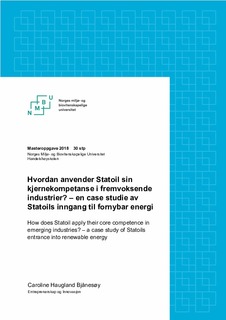| dc.contributor.advisor | Anders, Lunnan | |
| dc.contributor.advisor | Nygaard, Morten | |
| dc.contributor.author | Bjånesøy, Caroline Haugland | |
| dc.coverage.spatial | Norway | nb_NO |
| dc.date.accessioned | 2018-10-04T11:08:27Z | |
| dc.date.available | 2018-10-04T11:08:27Z | |
| dc.date.issued | 2018 | |
| dc.identifier.uri | http://hdl.handle.net/11250/2566406 | |
| dc.description.abstract | Energi regnes som den største bidragsyteren til de globale klimautfordringene som er en åpenbar trussel for både jordkloden og menneskets sikkerhet og utvikling. Mer enn tre fjerdedeler av verdens energiforbruk kommer fra fossile energikilder. Fornybar energi er en fremvoksende industri som stadig flere olje- og gasselskaper entrer for en bærekraftig fremtid.
Dette er en kvalitativ, eksplorativ case-studie av Statoils omstilling fra olje og gass til fornybar energi.
Studien belyser effekten av bruk av kjernekompetanse inn mot nye industrier. Hensikten med studien var å studere hvordan Statoil bruker sin kjernekompetanse fra olje- og gassvirksomhet inn mot fornybar energi. Det vil bli analysert og diskutert hvordan kjernekompetanse kan gi fortrinn og redusere barrierer for inngang til fremvoksende industrier, samt hvordan utnyttelse og utvikling av kjernekompetanse på tvers av divisjoner foregår.
Følgende problemstilling er satt opp: Hvordan anvender Statoil sin kjernekompetanse i fremvoksende industrier? – en case studie av Statoils inngang til fornybar energi.
Studien viser at ved anvendelse av kjernekompetanse inn mot fremvoksende industrier kan Statoil godta en mindre modningsgrad. Statoils grunntanke for inngang til nye industrier er gjennom utnyttelse av ressurser, kapabiliteter og kjernekompetanse. Det viser seg imidlertid at overførbarheten og anvendelsen i nye industrier kan by på utfordringer. | nb_NO |
| dc.description.abstract | Energy is considered as the biggest contributor to global climate challenges, which is an obvious threat to both the planet and human security and development. More than three quarters of world's energy consumption comes from fossil fuels. To achieve a sustainable future, oil and gas companies are increasingly entering the renewable energy industry. This is a qualitative, exploratory case-study of Statoil's conversion from oil and gas to renewable energy.
The study highlights the effect of using core competence towards new industries. The purpose of the study was to see how Statoil uses its core competence from oil and gas activities towards renewable energy. The study will analyse and discuss how core competence can give advantages and reduce barriers in entering emerging industries, as well as how utilization and development of core competence across divisions takes place.
The study addresses the following research question: How does Statoil apply its core competence in emerging industries? - a case study of Statoil's entrance into renewable energy.
The result shows that Statoil can accept a lesser degree of maturity with use of their core competence towards emerging industries. Statoil's basic idea for entering new industries is through the utilization of resources, capabilities and core competencies. However, it appears that the transferability and application of new industries can present challenges. | nb_NO |
| dc.language.iso | nob | nb_NO |
| dc.publisher | Norwegian University of Life Sciences, Ås | nb_NO |
| dc.rights | Attribution-NonCommercial-NoDerivatives 4.0 Internasjonal | * |
| dc.rights.uri | http://creativecommons.org/licenses/by-nc-nd/4.0/deed.no | * |
| dc.title | Hvordan anvender Statoil sin kjernekompetanse i fremvoksende industrier? : en case studie av Statoils inngang til fornybar energi | nb_NO |
| dc.title.alternative | How does Statoil apply their core competence in emerging industries? : a case study of Statoils entrance into renewable energy | nb_NO |
| dc.type | Master thesis | nb_NO |
| dc.description.version | publishedVersion | nb_NO |
| dc.description.localcode | M-EI | nb_NO |

